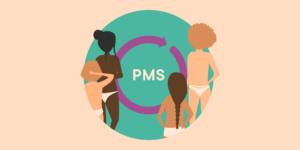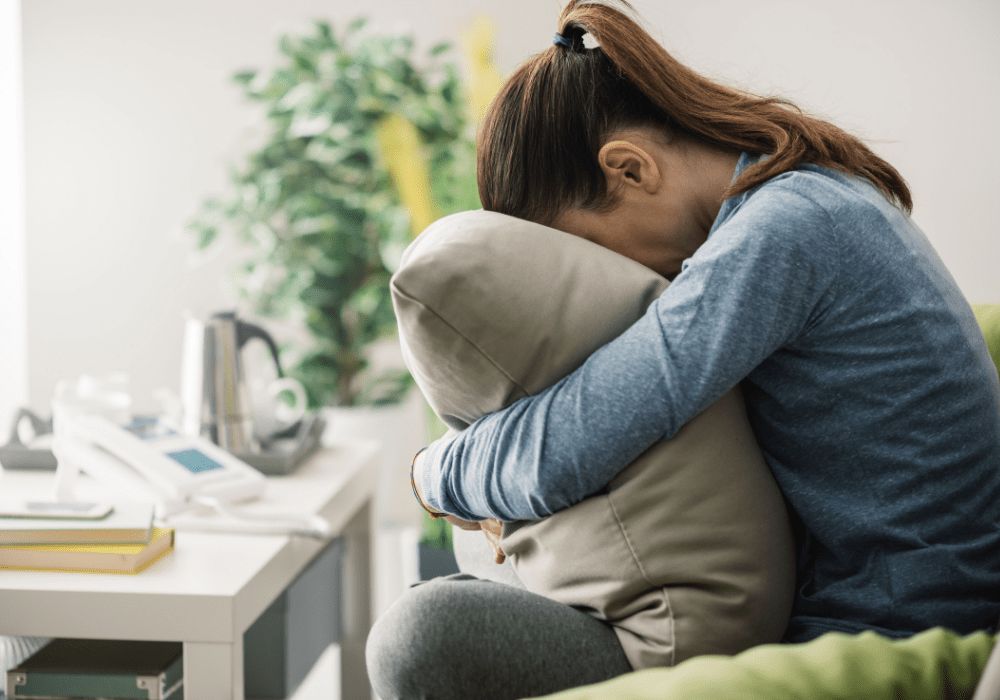Premenstrual Syndrome (PMS) is a condition that affects many women. Symptoms can include mood swings, irritability, bloating, and fatigue. For some women, PMS can also cause anxiety and panic attacks. If you are struggling with PMS anxiety, don’t worry – you are not alone! In this blog post, we will discuss what PMS anxiety is, its symptoms of it, and how to deal with it.
Contents
What Is PMS Anxiety?
 PMS refers to premenstrual syndrome, a group of symptoms that occur in the days leading up to your period. For some people, PMS is more than just a nuisance. And for others, it might be a sign of something more serious, like premenstrual dysphoric disorder (PMDD).
PMS refers to premenstrual syndrome, a group of symptoms that occur in the days leading up to your period. For some people, PMS is more than just a nuisance. And for others, it might be a sign of something more serious, like premenstrual dysphoric disorder (PMDD).
PMS anxiety is a type of anxiety that occurs during the days leading up to your period. It can be accompanied by other symptoms, such as irritability, mood swings, and depression. While PMS anxiety is not an official diagnosis, it is a real phenomenon that can affect people of all ages.
According to studies, PMS anxiety is most common in women who are in their 20s and 30s. However, it can also affect women of all ages, including postmenopausal women. Therefore if you are experiencing anxiety during the days leading up to your period, you are not alone. Seek help from a mental health professional if your anxiety is impacting your daily life.
How Does PMS Anxiety Feel Like?
It’s normal to feel some anxiety before your period. But for some people, the anxiety is so severe that it disrupts their daily lives. PMS anxiety feels like a constant worry or stress that doesn’t go away. You may feel on edge, have trouble sleeping, or be easily irritable. For example, you may startle easily, feel like you can’t concentrate, or be worried about things that normally wouldn’t bother you.
PMS anxiety can also cause physical symptoms, such as:
- Headaches
- Stomachaches
- Fatigue
You may feel like you’re in danger or that something bad is going to happen. This can make it hard to do everyday activities, such as going to work or school. PMS anxiety can be debilitating, but there are things you can do to feel better.
But all above it is important to understand the signs of anxiety so that you can identify it and get the help you need. For instance, if your anxiety is accompanied by a racing heart, chest pain, or difficulty breathing, it may be a panic attack. These symptoms can be frightening, but they’re not harmful.
Therefore, be aware of the symptoms and get help if you need it. There are many effective treatments for PMS anxiety, just make sure to talk to your doctor. You don’t have to suffer from PMS anxiety alone.
Why Do I Get Anxious Before My Period?
 There are a few different reasons why you might get anxious before your period. Let’s take a look at some of them.
There are a few different reasons why you might get anxious before your period. Let’s take a look at some of them.
One reason could be that you’re worried about the physical symptoms you’ll experience during your period. Maybe you’re afraid of having cramps so bad that you can’t function, or of bleeding so heavily that you’ll ruin your clothes.
Another reason could be the psychological symptoms associated with PMS. For some people, PMS can cause mood swings, irritability, and even depression. If you’re worried about how these symptoms will affect your life, it’s understandable that you might feel anxious.
Also, you could have PMDD (Premenstrual Dysphoric Disorder). This is a severe form of PMS that can cause anxiety, depression, and irritability. PMDD can be very debilitating, and it’s important to get help if you think you might have it.
Finally, you might also be anxious because of the changes in your hormones. Just before your period, your levels of progesterone and estrogen drop sharply. This can be the major cause of why you are feeling anxious right before your period.
Therefore, these are some possible explanations for why you might be feeling anxious before your period. If you’re concerned about your anxiety, talk to your doctor. They can help you figure out what’s going on and how to deal with it.
What Triggers PMS Anxiety?
 There are a variety of factors that can contribute to PMS anxiety. For some women, it may be due to hormonal changes that occur during the menstrual cycle. But for others, the triggers can be more psychological, such as:
There are a variety of factors that can contribute to PMS anxiety. For some women, it may be due to hormonal changes that occur during the menstrual cycle. But for others, the triggers can be more psychological, such as:
- Stress: It is no secret that stress can cause a variety of physical and mental health problems. But did you know that it can also worsen PMS symptoms? If you are already feeling anxious or stressed out, the added stress of PMS can make your symptoms even worse.
- History of depression or anxiety: If someone has a history of anxiety or depression, then they are more prone to getting triggered during PMS. Because of the hormonal changes that occur during this time, can cause a temporary relapse of symptoms.
- Sleep problems: During periods, many women tend to experience insomnia or restless sleep. This can make anxiety worse because of the lack of rest.
- Diet: Eating a lot of sugary and processed foods can worsen PMS symptoms, including anxiety. For example, if you drink a lot of caffeine, it can make you feel more jittery and anxious.
- Low self-esteem: Women who have low self-esteem are also more likely to experience anxiety during PMS. This is because they tend to be more critical of themselves and their bodies during this time.
These are a few triggers that PMS anxiety. Now that you know what can trigger your anxiety, let’s move on to some risk factors because not everyone who experiences these triggers will get anxiety. A few risk factors can increase your chances of getting PMS anxiety, such as:
- Family history
- Breakup or divorce
- Loss of a job or other major life stressor
- Pregnancy or menopause
- A history of sexual abuse or trauma
- Seeing someone with PMS anxiety
If you have any of these risk factors, then you may be more likely to experience PMS anxiety. But even if you don’t have any of these risk factors, it’s still possible to get PMS anxiety. So what can you do to cope with this condition? Yes, there are some ways definitely to help you recover from this condition. Continue to read on further!
How Does It Impact Life?
As many as three out of every four women will suffer from some form of premenstrual syndrome (PMS), according to research by Gynecologists. For some, it’s a mild annoyance. But for others, PMS can be so severe that it disrupts their lives. Some common consequences of PMS anxiety are:
- Social withdrawal: It is very common for women with PMS to want to withdraw from social activities and isolate themselves. Because of the anxiety and negative feelings associated with PMS, women may feel like they can’t face the world.
- Poor work performance: Many women find that their work suffers during the days leading up to their period. The anxiety and emotional upheaval of PMS can make it difficult to concentrate on tasks, resulting in errors or sub-par work.
- Relationship difficulties: It is not uncommon for PMS to cause arguments and tension in relationships. The stress of PMS can lead to irritability and moodiness, which can be difficult for even the most understanding partner to deal with.
In addition to these major impacts, PMS can also cause a number of physical symptoms, such as:
- Bloating
- Breast tenderness
- Headaches
- Fatigue
All of these factors can combine to make life very difficult for women who suffer from PMS anxiety. You must not take this lightly if you are one of them. And seek professional help if your symptoms are severe.
Does PMS Get Worse As You Age?
 Many women find that their PMS symptoms become more severe as they age. This may be due to the fact that older women are more likely to have other health conditions that can contribute to PMS symptoms, such as anxiety and depression.
Many women find that their PMS symptoms become more severe as they age. This may be due to the fact that older women are more likely to have other health conditions that can contribute to PMS symptoms, such as anxiety and depression.
It can also be due to the fact that older women are more likely to be dealing with other stressors in their lives, such as work and family responsibilities. If you’re finding that your PMS symptoms are getting worse as you age, it’s important to talk to your doctor about possible solutions.
There are a number of different treatments that can help relieve PMS anxiety. So you need to be willing to work with your doctor to find the best solution for you. This condition can be managed, and you don’t have to suffer through it every month. Know that you’re not alone. Many women deal with this condition on a monthly basis. But recovery is possible!
How Can I Stop PMS Anxiety?
There are some things you can do to ease your anxiety during PMS:
- Get active: People often feel better after exercising, and it can help to take your mind off of your anxiety. A simple walk can do wonders. You don’t need to do heavy exercise or weightlifting, just being active is the main motive.
- Talk to someone: Don’t suffer in silence. Talk to a friend, family member, therapist, or anyone else who will listen and offer support. Just getting your anxiety out in the open can be a huge relief.
- Relaxation techniques: There are many different relaxation techniques that can help with anxiety, such as deep breathing, progressive muscle relaxation, and visualization. Experiment to see what works best for you.
- Watch your diet: Eating healthy foods can help to ease PMS symptoms, which in turn can help with anxiety. Avoid sugary and processed foods, and make sure to get plenty of fruits, vegetables, and whole grains.
- Avoid caffeine: It’s best to avoid caffeine during PMS, as it can make anxiety worse. Stick to decaffeinated coffee, tea, and soda.
- Supplements: There are several supplements that have been shown to help with PMS symptoms, including calcium, magnesium, vitamin B- complex, and omega-three fatty acids. Talk to your doctor to see if any of these might be right for you.
- Massage: You can give yourself a massage or ask someone to do it for you. It can relax your muscles and ease tension headaches, which can help to reduce anxiety.
PMS anxiety can be tough to deal with, but these are some things that can help. Just remember to be patient with yourself, as it can take some time to find what works best for you. And if your anxiety is really severe, don’t hesitate to reach out to a mental health professional. They can help you develop a treatment plan that will work for you.
Is Professional Help Needed?
 PMS anxiety is a normal and common occurrence. However, if PMS anxiety is severe and/or getting in the way of your daily life, it might be time to seek professional help. For example, some warning signs can include:
PMS anxiety is a normal and common occurrence. However, if PMS anxiety is severe and/or getting in the way of your daily life, it might be time to seek professional help. For example, some warning signs can include:
- Dramatic changes in mood or behavior
- Eating disorders
- Complete isolation
- Missing work or school
If any of these sound familiar, please reach out to a professional for help. You don’t have to suffer through PMS anxiety alone!
A therapist can help you understand and manage your anxiety. They can provide you with tools and techniques to deal with your anxiety in a healthy way. If you think you might need professional help, please reach out. There are many resources available to you.
PMS anxiety is a real and common problem. Understand and acknowledge your anxiety. Seek professional help if necessary. You are not alone in this!
Conclusion
In conclusion, PMS anxiety is often caused by hormonal changes during the menstrual cycle. While it can be uncomfortable and even debilitating at times, there are things you can do to manage your symptoms. If you think you may be suffering from PMS anxiety, talk to your doctor about treatment options.
There are a number of different ways to treat PMS anxiety. Some people find that making lifestyle changes, such as exercising regularly and eating a balanced diet, helps to reduce their symptoms. Others may need to take medication to manage their anxiety. If you are struggling with PMS anxiety, talk to your doctor about the best treatment options for you.
For more information and guidance please get in touch with our expert therapists at Therapy Mantra. They will be more than happy to assist you on your journey to recovery. Contact us today to learn more about our services. You can also book an online therapy session or download our free Android or iOS app.


